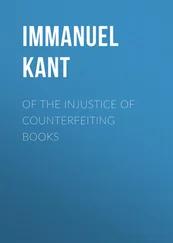By the term “knowledge a priori ,” therefore, we shall in the sequel understand, not such as is independent of this or that kind of experience, but such as is absolutely so of all experience. Opposed to this is empirical knowledge, or that which is possible only a posteriori , that is, through experience. Knowledge a priori is either pure or impure. Pure knowledge a priori is that with which no empirical element is mixed up. For example, the proposition, “Every change has a cause,” is a proposition a priori , but impure, because change is a conception which can only be derived from experience.
II. The Human Intellect, even in an Unphilosophical State, is in Possession of Certain Cognitions “ a priori ”.
Table of Contents
The question now is as to a criterion, by which we may securely distinguish a pure from an empirical cognition. Experience no doubt teaches us that this or that object is constituted in such and such a manner, but not that it could not possibly exist otherwise. Now, in the first place, if we have a proposition which contains the idea of necessity in its very conception, if, moreover, it is not derived from any other proposition, unless from one equally involving the idea of necessity, it is absolutely priori. Secondly, an empirical judgement never exhibits strict and absolute, but only assumed and comparative universality (by induction); therefore, the most we can say is — so far as we have hitherto observed, there is no exception to this or that rule. If, on the other hand, a judgement carries with it strict and absolute universality, that is, admits of no possible exception, it is not derived from experience, but is valid absolutely a priori .
Empirical universality is, therefore, only an arbitrary extension of validity, from that which may be predicated of a proposition valid in most cases, to that which is asserted of a proposition which holds good in all; as, for example, in the affirmation, “All bodies are heavy.” When, on the contrary, strict universality characterizes a judgement, it necessarily indicates another peculiar source of knowledge, namely, a faculty of cognition a priori . Necessity and strict universality, therefore, are infallible tests for distinguishing pure from empirical knowledge, and are inseparably connected with each other. But as in the use of these criteria the empirical limitation is sometimes more easily detected than the contingency of the judgement, or the unlimited universality which we attach to a judgement is often a more convincing proof than its necessity, it may be advisable to use the criteria separately, each being by itself infallible.
Now, that in the sphere of human cognition we have judgements which are necessary, and in the strictest sense universal, consequently pure a priori , it will be an easy matter to show. If we desire an example from the sciences, we need only take any proposition in mathematics. If we cast our eyes upon the commonest operations of the understanding, the proposition, “Every change must have a cause,” will amply serve our purpose. In the latter case, indeed, the conception of a cause so plainly involves the conception of a necessity of connection with an effect, and of a strict universality of the law, that the very notion of a cause would entirely disappear, were we to derive it, like Hume, from a frequent association of what happens with that which precedes; and the habit thence originating of connecting representations — the necessity inherent in the judgement being therefore merely subjective. Besides, without seeking for such examples of principles existing a priori in cognition, we might easily show that such principles are the indispensable basis of the possibility of experience itself, and consequently prove their existence a priori . For whence could our experience itself acquire certainty, if all the rules on which it depends were themselves empirical, and consequently fortuitous? No one, therefore, can admit the validity of the use of such rules as first principles. But, for the present, we may content ourselves with having established the fact, that we do possess and exercise a faculty of pure a priori cognition; and, secondly, with having pointed out the proper tests of such cognition, namely, universality and necessity.
Not only in judgements, however, but even in conceptions, is an a priori origin manifest. For example, if we take away by degrees from our conceptions of a body all that can be referred to mere sensuous experience — colour, hardness or softness, weight, even impenetrability — the body will then vanish; but the space which it occupied still remains, and this it is utterly impossible to annihilate in thought. Again, if we take away, in like manner, from our empirical conception of any object, corporeal or incorporeal, all properties which mere experience has taught us to connect with it, still we cannot think away those through which we cogitate it as substance, or adhering to substance, although our conception of substance is more determined than that of an object. Compelled, therefore, by that necessity with which the conception of substance forces itself upon us, we must confess that it has its seat in our faculty of cognition a priori .
III. Philosophy stands in need of a Science which shall Determine the Possibility, Principles, and Extent of Human Knowledge “ a priori ”
Table of Contents
Of far more importance than all that has been above said, is the consideration that certain of our cognitions rise completely above the sphere of all possible experience, and by means of conceptions, to which there exists in the whole extent of experience no corresponding object, seem to extend the range of our judgements beyond its bounds. And just in this transcendental or supersensible sphere, where experience affords us neither instruction nor guidance, lie the investigations of reason, which, on account of their importance, we consider far preferable to, and as having a far more elevated aim than, all that the understanding can achieve within the sphere of sensuous phenomena. So high a value do we set upon these investigations, that even at the risk of error, we persist in following them out, and permit neither doubt nor disregard nor indifference to restrain us from the pursuit. These unavoidable problems of mere pure reason are God, freedom (of will), and immortality. The science which, with all its preliminaries, has for its especial object the solution of these problems is named metaphysics — a science which is at the very outset dogmatical, that is, it confidently takes upon itself the execution of this task without any previous investigation of the ability or inability of reason for such an undertaking.
Now the safe ground of experience being thus abandoned, it seems nevertheless natural that we should hesitate to erect a building with the cognitions we possess, without knowing whence they come, and on the strength of principles, the origin of which is undiscovered. Instead of thus trying to build without a foundation, it is rather to be expected that we should long ago have put the question, how the understanding can arrive at these a priori cognitions, and what is the extent, validity, and worth which they may possess? We say, “This is natural enough,” meaning by the word natural, that which is consistent with a just and reasonable way of thinking; but if we understand by the term, that which usually happens, nothing indeed could be more natural and more comprehensible than that this investigation should be left long unattempted. For one part of our pure knowledge, the science of mathematics, has been long firmly established, and thus leads us to form flattering expectations with regard to others, though these may be of quite a different nature. Besides, when we get beyond the bounds of experience, we are of course safe from opposition in that quarter; and the charm of widening the range of our knowledge is so great that, unless we are brought to a standstill by some evident contradiction, we hurry on undoubtingly in our course. This, however, may be avoided, if we are sufficiently cautious in the construction of our fictions, which are not the less fictions on that account.
Читать дальше












